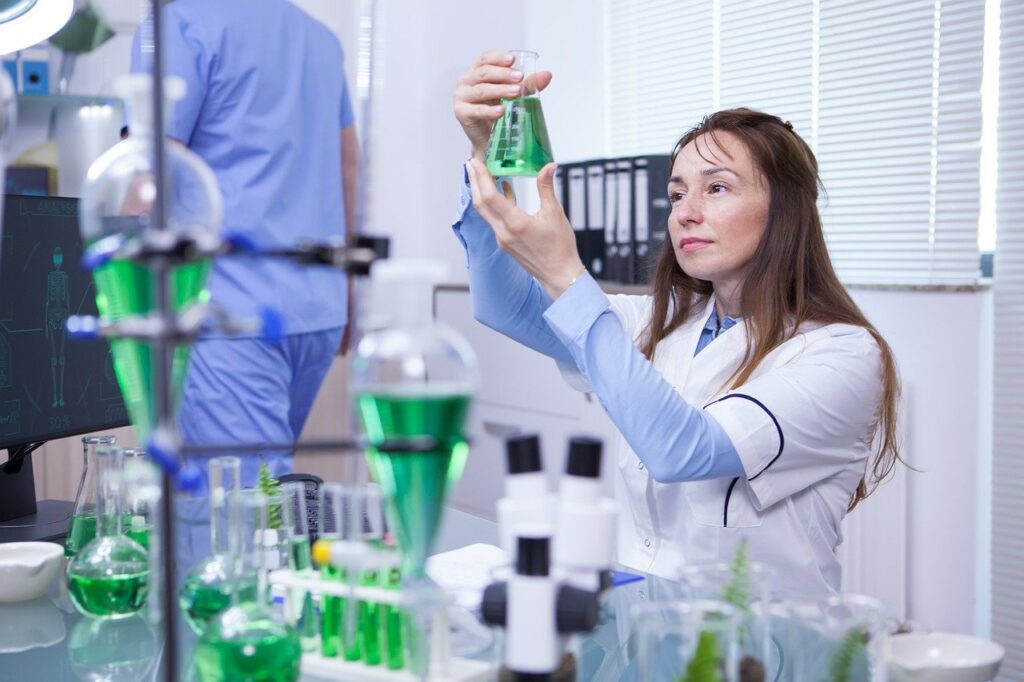"Creating Your Home Lab with 24 Seven Home Care: A Comprehensive Guide"
Table of Contents
In the rapid rhythm of today’s lifestyle, possessing a dependable home laboratory marks a significant advantage. For hobbyists passionate about science, individuals who prefer doing things themselves, or those focused on their health and wellness, establishing a home laboratory equips you with the necessary tools and resources for a wide range of experiments, projects, and health-related tasks. This article delves into the concept of a home lab and discusses how 24 Seven Home Care can assist you in setting up an effective and productive lab space within your residence.
What is a Home Lab?
A home laboratory is a specific area within your home dedicated to performing experiments, conducting research, and working on projects across a variety of disciplines including science, technology, engineering, and healthcare. It offers a creative environment where you are free to explore your interests and passions without the necessity of high-cost equipment or access to professional labs.
Benefits of Having a Home Lab
Flexibility: With a home laboratory, you have the liberty to tackle your projects at any given time, eliminating the need to book slots at external facilities.
Cost-Effective: Although the initial setup of a personal lab necessitates some outlay, this move is financially beneficial over time since it cuts down on periodic expenses such as laboratory usage fees and the hire of apparatus.
Educational Benefits: A domestic lab serves as an exceptional platform for immersive learning, offering direct involvement in a variety of subjects.
Personalization: Possessing your own lab space means having the advantage of configuring the setup, from the selection of instruments to the organizational layout, according to your unique preferences and requirements.
Setting Up Your Home Lab
Setting up a personal laboratory at home requires a series of crucial steps, ranging from choosing an appropriate space to gathering the required tools and adhering to safety measures. We’ll explore each of these critical steps thoroughly.
Choosing the Right Location
The location of your home lab is crucial to its success. Ideally, it should be in a well-ventilated area with ample natural light. Consider the following factors:
Space Availability:
Ensure you have enough space to accommodate your equipment and work comfortably.
Accessibility:
Make sure the lab is easily accessible and doesn’t disrupt your daily routine or family life.
Safety:
Keep safety in mind. For example, if you plan to work with chemicals, choose a location with good ventilation to avoid fumes.
Acquiring Equipment and Supplies
The equipment and supplies you need will depend on your specific interests and projects. Here’s a list of some common items to consider:
Basic Lab Equipment:
Beakers, test tubes, pipettes, and a microscope for science-related experiments.
DIY Tools:
If you’re into electronics or woodworking, tools like soldering irons, drills, and saws are essential.
Healthcare Essentials:
For healthcare-related experiments or maintaining your well-being, consider items like a blood pressure monitor, thermometer, and first aid kit.
Safety Gear:
Depending on your projects, you may need safety goggles, gloves, and lab coats.
Organizing Your Home Lab
Efficient organization is key to a successful home lab. Invest in shelves, storage containers, and labeling systems to keep everything in order. Having a clutter-free workspace ensures you can work more effectively and safely.
Safety First
Safety should always be a top priority in your home lab. Here are some safety tips to follow:
Consult Manuals and Follow Guidance: It’s important to adhere to the guidelines provided with your tools and substances.
Air Circulation: Maintaining proper ventilation in your workspace is crucial to reducing the risks associated with inhaling vapors or particles.
Be Prepared for Emergencies: Ensure access to a fire extinguisher and a first-aid kit is unobstructed.
Handling Hazardous Waste: The disposal of dangerous materials should be in line with the regulations set by your local authority.
Maintenance and Upkeep
Continuously upkeep and cleanse your tools to guarantee their proper function. Swiftly substitute any materials that are either used up or beyond their use date. Doing so will extend your equipment’s lifespan and keep the precision of your experiments intact.
How 24 Seven Home Care Can Help

Now that you have a clear understanding of how to set up your home lab let’s explore how 24 Seven Home Care can be a valuable partner in your journey.
Healthcare Services
24 Seven Home Care delivers a comprehensive array of health services ideal for enhancing your home laboratory environment. Their skilled team can support you with:
Observing critical health indicators: Leveraging their medical knowledge, they are able to assist in monitoring your health metrics, simplifying the process of performing health-related research or looking after your personal health.
Handling medications: Should your experiments or health routine necessitate medication, their care providers can help ensure that you adhere to your prescribed medication regimen.
Assistance with Experiments
Should your research projects require additional support, 24 Seven Home Care is equipped to offer skilled aides capable of aiding in:
Gathering information: These aides are available to assist in collecting information throughout your research activities, ensuring both accuracy and thoroughness.
Handling specimens: In the realm of scientific research, the correct management of specimens is vital. The caregivers are prepared to aid in the preparation and preservation of samples.
Safety and Support
At 24 Seven Home Care, your health and safety come first. Their team of professional caregivers is dedicated to:
Ensuring your surroundings are secure: They assist in keeping your home laboratory space tidy and well-organized, minimizing the chances of potential accidents.
Providing immediate care in emergencies: Should any accidents occur, their caregivers are proficient in first aid and ready to provide prompt support.
Personalized Care Plans
At 24 Seven Home Care, we recognize the distinct requirements of each person. Our services include customized care plans specifically designed to assist with your at-home laboratory tasks and promote your overall health.
Certainly! Let's delve deeper into each section to provide a more comprehensive guide on setting up your home lab and how 24 Seven Home Care can assist you throughout the process.
Choosing the Right Location
Consider the Nature of Your Work
The kind of experiments or projects you engage in will have a significant impact on your choice of workspace. If your work involves handling chemicals, it’s important to opt for a location that provides ample ventilation to ensure that any hazardous fumes are properly dispersed. Conversely, those concentrating on electronics or woodworking may find a space that benefits from both good lighting and adequate ventilation to be preferable.
Accessibility and Comfort
Make sure the location you choose for your setup is conveniently located so you can move smoothly between your personal workspace and your other everyday commitments. The space should be inviting and spark both creativity and productivity. It’s important to have good lighting, efficient temperature management, and comfortable seating arrangements.
Privacy and Noise
For tasks that demand your undivided attention or discretion, like researching or drafting documents, choosing a secluded and silent space in your house is advisable. By reducing interruptions, you can notably enhance both the quality and efficiency of your work.
Acquiring Equipment and Supplies
Tailoring to Your Interests
The equipment and supplies you need will differ based on your hobbies and interests. Consider these widely recognized categories:
For those engaged in scientific research, whether in chemistry, biology, or physics, it’s crucial to invest in necessary items such as glassware, microscopes, and various laboratory instruments.
Hobbyists interested in electronics, woodworking, or crafts should collect essential tools like soldering irons, drills, saws, and a range of manual tools.
If your focus is on health and wellness, you might want to acquire health-related essentials such as blood pressure cuffs, thermometers, blood glucose meters, and basic first aid kits.
Budget Considerations
When setting up your personal laboratory at home, it’s crucial to be mindful of your budget. Start by investing in the most critical equipment first and then, as your hobbies or projects grow and change, you can slowly add more tools to your collection. Opting for high-quality apparatus is beneficial in the long term because it increases both the precision and dependability of your experiments or projects.
Organizing Your Home Lab
Storage Solutions
To enhance the functionality of your home laboratory, organizing it effectively is crucial. Consider investing in various storage solutions such as shelves, drawers, and containers to ensure that all your tools and supplies are properly sorted. Implementing a labeling system or utilizing a digital tool to manage inventory will simplify the process of finding items as needed.
Workstation Setup
Allocate distinct zones in your home laboratory for various kinds of tasks. For example, set up a neat, uncluttered space exclusively for precise activities, such as using a microscope, and designate a different zone for tasks that could get messy, like conducting chemical experiments or engaging in carpentry.
Safety First
Familiarize Yourself with Safety Protocols
Prior to embarking on any experimental procedures, it’s crucial to acquaint yourself with the safety measures pertinent to your specific area of study. Make a point to meticulously go through all labels and directions, gaining a clear comprehension of the risks linked to the substances and tools you will be using.
Ventilation
Adequate air circulation is crucial for maintaining a secure laboratory environment at home. Should your experiments involve chemical substances or produce vapors, it’s advisable to have exhaust fans installed or conduct your work in the vicinity of openable windows to ensure the flow of fresh air.
Emergency Preparedness
Even when conducting experiments in a household laboratory, mishaps are a possibility. It’s crucial to have a fire extinguisher, a basic medical kit, and the details of emergency contacts within easy reach. Make an effort to learn elementary first aid techniques and see to it that those who take care of you or live with you are informed about the safety protocols you have in place.
Maintenance and Upkeep
Regular Inspections
Periodically inspect your equipment for wear and tear. Check for any signs of damage or malfunction and address issues promptly to ensure the continued reliability of your lab.
Calibration and Calibration Records
For scientific instruments, such as microscopes or pH meters, maintain a calibration schedule and keep records of calibrations performed. This helps ensure the accuracy of your measurements.
How 24 Seven Home Care Can Help
Now, let’s explore in more detail how 24 Seven Home Care can be an invaluable partner in your home lab journey.
Healthcare Services
24 Seven Home Care offers a wide range of healthcare services tailored to your needs:
Monitoring Vital Signs
Their trained professionals can assist with monitoring vital signs, including blood pressure, heart rate, and temperature. This is especially valuable for health-related experiments or if you’re monitoring your well-being.
Medication Management
If your experiments or personal health regimen involves medication, 24 Seven Home Care caregivers can help you manage your medication schedule, ensuring you take your medication as prescribed.
Assistance with Experiments
Data Collection
In scientific research, accurate data collection is crucial. Caregivers can assist with data collection during experiments, ensuring that all data points are recorded correctly and consistently.
Sample Handling
Proper handling and storage of samples are essential in scientific experiments. Caregivers can assist with sample preparation, labeling, and storage, helping to maintain the integrity of your research.
Safety and Support
Safe Environment
24 Seven Home Care prioritizes your safety. Caregivers can help you maintain a safe home lab environment by identifying and mitigating potential hazards, ensuring proper storage of chemicals, and adhering to safety protocols.
First Aid
In the event of accidents or injuries, caregivers are trained in first aid and can provide immediate assistance. Their presence adds an extra layer of safety to your home lab.
Personalized Care Plans
In Dubai, 24 Seven Home Care recognizes the distinct requirements of every individual. They provide customizable care plans designed to accommodate your specific needs for home laboratory activities and to enhance your overall health. This approach of personalized support ensures that the particular assistance you need is effectively delivered.
Of course, I'd be happy to explain the expanded sections of the blog post in more detail:
Choosing the Right Location
Consider the Nature of Your Work:
This passage highlights the importance of choosing an appropriate location for your home laboratory based on the specific nature of your experiments or projects. For those engaging in chemical work, selecting a space with excellent air circulation is crucial to ensure the safe expulsion of any dangerous gases. Conversely, activities focusing on electronics or woodworking necessitate a space that is not only spacious and airy but also suffused with ample light to support these tasks effectively.
Accessibility and Comfort:
Selecting a location for your home lab that is both convenient and comfortable is vital. This choice guarantees a seamless integration of your lab activities with everyday tasks. Moreover, this passage underscores the importance of elements such as proper lighting, temperature regulation, and ergonomic seating to foster an optimal working atmosphere.
Privacy and Noise:
In this discussion, the focus is on the significance of ensuring privacy and reducing auditory interruptions. When the work from your home laboratory demands high levels of focus, especially if you’re dealing with sensitive matters, opting for a place that offers quietness and solitude can significantly improve the quality and productivity of your work.
Acquiring Equipment and Supplies
Tailoring to Your Interests:
The highlighted section points out the importance of selecting equipment and supplies that match your particular passions and projects. It recommends different types of equipment tailored to specific areas of interest—scientific tools for those conducting experiments in fields such as chemistry or biology, DIY equipment for hobbyists interested in electronics or carpentry, and essential healthcare items for those dedicated to health monitoring.
Budget Considerations:
The importance of managing your budget is highlighted here. While investing in quality equipment is encouraged, the section advises starting with essential items and gradually expanding your inventory as your needs and projects evolve.
Organizing Your Home Lab
Storage Solutions:
Efficient organization is essential for maintaining a functional home lab. The section suggests investing in storage solutions like shelves, drawers, and containers, along with labeling systems, to keep your equipment and supplies neatly arranged and easily accessible. Just order a doctor on call in Dubai to get best home lab.
Workstation Setup:
Allocating defined spaces within your household laboratory for varied tasks is advisable. Consider establishing a neat, organized station for detailed activities such as microscopy, and designate a different zone for experiments that may involve spills or messes. This strategy is effective in tailoring your work area to suit the distinct needs of various projects.
Familiarize Yourself with Safety Protocols:
This passage highlights the critical need for proficiency in safety protocols specific to your employment sector. It points out the vital importance of carefully reading and understanding the labels and instructions attached to equipment and materials, as a measure to guarantee their safe usage.
Ventilation:
Emphasizing the importance of proper air flow, especially when handling chemical substances or materials emitting vapors, is crucial for safety. The advice provided recommends the deployment of exhaust fans or the option to work close to windows that are open to ensure there is continuous movement of air.
Emergency Preparedness:
In this section, we explore the significance of being ready for unexpected situations. It is advised to keep critical safety tools such as fire extinguishers and first aid kits accessible and to be proficient in their use. Moreover, it is essential for family members or caregivers to be informed about these precautionary steps.
Regular Inspections:
This segment underscores the importance of conducting regular evaluations to detect any deterioration or damage in your instruments. Swiftly dealing with these problems ensures that your laboratory apparatus stays in prime operating condition.
Calibration and Calibration Records:
For those using scientific tools, it’s crucial to stick to a regular calibration plan and meticulously document each calibration event. Adhering to this approach guarantees the dependability and precision of your data collection and experimental outcomes.
Expanded discussions on this topic shed light on the intricacies of organizing a laboratory at home, covering everything from selecting an appropriate space to ensuring the safety and upkeep of your apparatus.
FAQ on the topic "Creating Your Home Lab with 24 Seven Home Care: A Comprehensive Guide":
What are the essential components needed to set up a home lab?
To set up a home lab, you will need the following essential components:
- Hardware: A computer with sufficient processing power, memory, and storage; networking equipment such as routers, switches, and cables; and peripheral devices like monitors, keyboards, and mice.
- Software: Operating systems (such as Windows, Linux, or macOS), virtualization software (like VMware or VirtualBox), and any specific applications or tools relevant to your field of study or work.
- Networking: A stable internet connection, IP addresses, and possibly a dedicated IP range for your lab network.
- Documentation: Manuals, guides, and documentation for your hardware and software setup.
How can I ensure the security of my home lab?
Securing your home lab involves several key steps:
- Network Security: Use firewalls to protect your network, segment your lab network from your home network, and implement strong passwords for all devices.
- Software Security: Keep all software and operating systems up to date with the latest patches and updates. Install antivirus and anti-malware programs.
- Access Control: Limit access to your home lab to only authorized users. Use multi-factor authentication (MFA) where possible.
- Data Backup: Regularly back up your data and configurations to prevent data loss in case of hardware failure or cyber attacks.
What are the benefits of creating a home lab?
Creating a home lab offers numerous benefits, including:
- Learning and Skill Development: A home lab provides a hands-on environment to learn new technologies, practice troubleshooting, and develop technical skills.
- Experimentation: You can test and experiment with different configurations, software, and hardware without affecting production environments.
- Career Advancement: Gaining practical experience in a home lab can enhance your resume and improve job prospects in IT and other technical fields.
- Convenience: Having a dedicated space for your projects at home allows for flexible learning and experimentation schedules.
How can I optimize the performance of my home lab?
To optimize the performance of your home lab:
- Upgrade Hardware: Ensure your computer has enough RAM, CPU power, and storage capacity. Consider using SSDs for faster data access.
- Efficient Network Configuration: Use gigabit Ethernet for faster network speeds, and ensure your router and switches can handle the bandwidth.
- Resource Management: Use virtualization software to allocate resources efficiently and avoid overcommitting your hardware.
- Regular Maintenance: Keep your systems clean, cool, and well-ventilated. Regularly check for and resolve hardware and software issues.
What type of home lab is best for different IT specializations?
The type of home lab setup depends on your IT specialization:
- Network Engineering: Focus on networking equipment like routers, switches, and network simulation software.
- Cybersecurity: Include security tools, firewalls, intrusion detection/prevention systems, and virtual machines to simulate attacks.
- System Administration: Use a mix of different operating systems, virtualization tools, and automation software.
- Software Development: Set up integrated development environments (IDEs), version control systems, and containers or virtual machines to test code.
How can 24 Seven Home Care assist in setting up and maintaining my home lab?
24 Seven Home Care can assist in several ways:
- Consultation Services: Providing expert advice on the best hardware and software configurations for your specific needs.
- Setup Assistance: Helping with the initial setup of your home lab, including installation and configuration of hardware and software.
- Maintenance and Support: Offering ongoing support to ensure your home lab runs smoothly, including troubleshooting, updates, and upgrades.
- Training: Providing training sessions on how to effectively use and manage your home lab, ensuring you get the most out of your investment.
Get Better With 24 Seven Home Care
Healing & Wellness At Your Doorstep
+971 50 8988247/+971 800 24724



